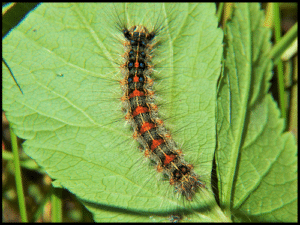
Fleeing a small lab about 150 years ago, they first feasted on New England’s forests before blazing a destructive trail westward and southward. Their appetite is limitless.
It sounds like an eco-disaster movie poster, right? Wrong. Instead of coming to a theater near you, this real-life menace is chewing up your backyard.
Eek! It’s the gypsy moth.
Keeping the Gypsy Moth at Bay
The government knows all about it…and wants you and long-distance movers such as A2B Moving & Storage of Auburn, WA, to help. By the way, It’s the law. These pests represent such an ecological threat that the U.S. Department of Agriculture requires those living in an infested area to inspect and, if necessary, remove gypsy-moth eggs from their household items before moving out of state to a non-infested location. An official inspection certificate also must be completed and submitted to the USDA.
Capable of killing 300-plus tree species via their voracious appetite for leaves, the chomping culprits are the caterpillars—not the full-grown moths—and these pests have defoliated more than 75 million U.S. acres since 1970.
Inspection Instructions
Suppose you’re planning an interstate move to Seattle or Bellevue, Washington or even such locations as Sammamish, Redmond, or Kirkland and relocating from any area within the following states. In that case, you’ll need to conduct a gypsy-moth inspection:
- New Hampshire
- Vermont
- Massachusetts
- Rhode Island
- Connecticut
- New York
- New Jersey
- Pennsylvania
- Maryland
- Delaware
- Michigan
- Other impacted regions are Washington, D.C., and portions of Maine, Virginia, West Virginia, North Carolina, Ohio, Indiana, Illinois, Wisconsin, and Minnesota.
Search and Destroy
USDA permits two eradication routes: Conduct your inspection using the government’s self-inspection checklist or hire a certified pesticide applicator.
Are they doing the job yourself? Experts say to check for gypsy-moth egg masses on the surfaces and crevices of all outdoor household items, including mailboxes, bird feeders, grills, lawn equipment, bicycles, ladders, water hoses, patio furniture, toys, and trailers.
If found, egg masses must be removed and destroyed. First, scrape them off with a tool such as a putty knife or stiff brush. Then, destroy egg masses (and other life stages, such as larvae) by placing them in a container of hot, soapy water or sealing them in a plastic bag and placing them in sunlight.
Checklist and Inspection
USDA officials advise marking each task on the checklist as it’s completed. If hiring a third-party pesticide applicator, ensure he provides you with a completed and signed checklist.
Government officials say those moving between April and August should inspect them on moving day (female moths lay eggs, and caterpillars spread during spring and summer). If that’s impossible, items must be protected from possible infestation via temporary storage by sealing them under a tarp, moving them indoors or stowing them in a closed moving truck.
Giving your cross-country movers a copy of the completed checklist is essential since a USDA or state official could request to view it at any point during an interstate move. USDA officials recommend keeping the checklist for at least five years after completing your cross-country move.
Contact Us Today
Are you seeking a moving company in Seattle that is considered among the region’s top-rated movers? Whether you need local or long-distance movers, A2B Moving & Storage is the best suited to handle the job carefully and courteously. Since 2009, we’ve been the long-distance movers in Auburn, WA, that people confidently count on. Contact us today for a FREE moving quote: 206.419.5748.
Frequently Asked Questions (FAQ)
What is the gypsy moth?
The gypsy moth is an invasive species of moth whose caterpillars are known for their voracious appetite for leaves. They pose a significant threat to forests and have defoliated millions of acres of land in the United States since 1970.
Why is it essential to inspect for gypsy moths before moving?
Inspecting for gypsy moths before moving is important because these pests can hitch a ride on household items and potentially infest new areas. It is a legal requirement in infested areas to inspect and, if necessary, remove gypsy moth eggs before moving to a non-infested location.
What states require gypsy moth inspections?
States that require gypsy moth inspections include New Hampshire, Vermont, Massachusetts, Rhode Island, Connecticut, New York, New Jersey, Pennsylvania, Maryland, Delaware, Michigan, and others. Washington D.C. and portions of Maine, Virginia, West Virginia, North Carolina, Ohio, Indiana, Illinois, Wisconsin, and Minnesota are also impacted.
How can I conduct a gypsy moth inspection?
You can conduct a gypsy moth inspection by checking for egg masses on the surfaces and crevices of outdoor household items. Use a tool like a putty knife or stiff brush to remove any egg masses found, and then destroy them by placing them in hot, soapy water or sealing them in a plastic bag and placing them in sunlight.
What should I do if I find gypsy moth eggs?
If you find gypsy moth eggs, you must remove and destroy them. Scrape them off the surface with a tool and then dispose of them by placing them in hot, soapy water or sealing them in a plastic bag and placing them in sunlight.
Do I need to hire a professional for gypsy moth eradication?
While you can conduct a gypsy moth inspection and eradication yourself, hiring a certified pesticide applicator is also an option. They can ensure that the eradication process is done correctly and safely.
How long do I need to keep the inspection checklist?
Keeping the inspection checklist for at least five years after your cross-country move is completed is recommended. This is in case a USDA or state official requests to view it at any point during an interstate move.
How can I contact A2B Moving & Storage for more information?
Call 206.419.5748 to contact A2B Moving & Storage for more information or to schedule a move. They are the top-rated movers in Seattle, WA, specializing in local and long-distance moves.
